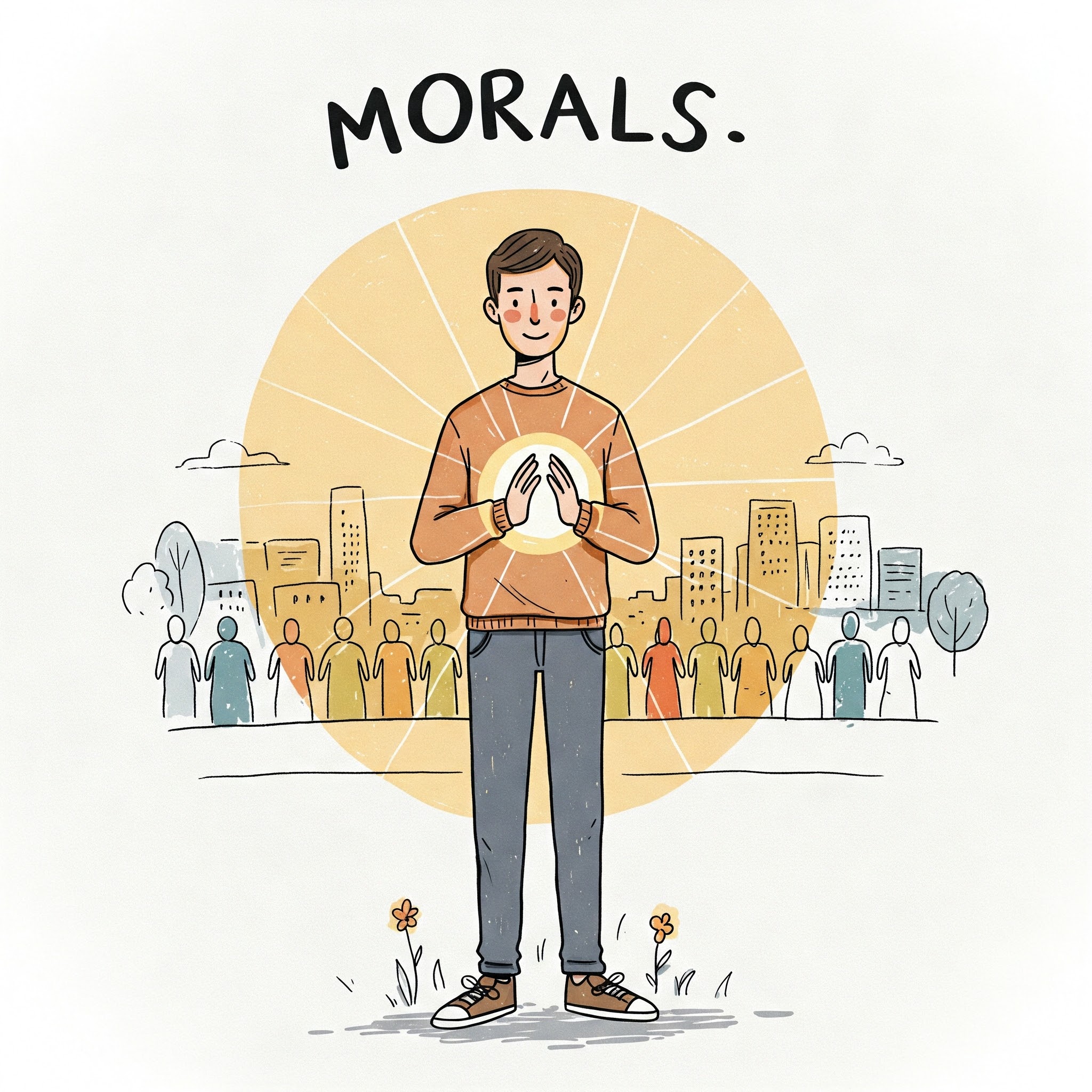Moral
Definition
Moral is an adjective and a noun. As an adjective, it relates to principles of right and wrong behavior, or expressing conformity to ethical standards. As a noun, it refers to the lesson derived from a story, experience, or event, or the principles governing proper conduct.
Parts of Speech
- Adjective
- Noun
Pronunciation
American English
- IPA Pronunciation: /ˈmɔːr.əl/, /ˈmɑːr.əl/
- Respelling: MOR-uhl, MAHR-uhl
British English
- IPA Pronunciation: /ˈmɒr.əl/
- Respelling: MOR-uhl
Etymology
The word "moral" comes from the Latin "moralis," meaning "pertaining to manners or morals," derived from "mos" (genitive "moris"), meaning "custom" or "habit." It was first adopted into Middle English from Old French.
Derivatives
- Morality (noun)
- Morally (adverb)
- Immoral (adjective)
- Amoral (adjective)
- Moralist (noun)
Synonyms
- Ethical
- Virtuous
- Principled
Antonyms
- Immoral
- Unethical
- Corrupt
Usage
The term "moral" is commonly used in discussions about ethics, literature, and behavior. For example, "The story teaches a valuable moral," or "He is guided by strong moral principles."
Related Terms
- Ethics: The branch of philosophy dealing with right and wrong behavior.
- Values: Principles or standards of behavior that are considered important.
- Integrity: The quality of being honest and having strong moral principles.
Detailed Definitions
Adjective
- Concerning principles of right and wrong behavior:
- Example: "The debate raised important moral questions."
- Expressing conformity to ethical standards:
- Example: "She is a moral person who always tries to do the right thing."
Noun
- The lesson or principle derived from a story or experience:
- Example: "The moral of the fable is to always tell the truth."
- Principles governing proper conduct:
- Example: "He believes in upholding the morals of society."
moral



🇨🇳 Mandarin (Simplified Chinese)
- 道德 (Dàodé): moral, ethical
- IPA Pronunciation: /taʊ˧˥ te˥˩/
- Respelling: (dau-deh)
- 寓意 (Yùyì): moral of a story
- IPA Pronunciation: /y˩˧˥ i˥˥/
- Respelling: (yu-ee)
🇮🇳 Hindi
- नैतिक (Naitik): moral, ethical
- IPA Pronunciation: /nəɪtɪk/
- Respelling: (nay-tik)
- सबक (Sabak): moral of a story
- IPA Pronunciation: /səbək/
- Respelling: (sub-uk)
🇪🇸 Spanish
- Moral: moral, ethical
- IPA Pronunciation: /moˈɾal/
- Respelling: (mo-ral)
- Moraleja: moral of a story
- IPA Pronunciation: /moɾaˈlexa/
- Respelling: (mo-ra-le-ha)
🇫🇷 French
- Moral: moral, ethical
- IPA Pronunciation: /mɔ.ʁal/
- Respelling: (mo-ral)
- Morale: moral of a story
- IPA Pronunciation: /mɔ.ʁal/
- Respelling: (mo-ral)
🇸🇦 Arabic (Modern Standard Arabic)
- أخلاقي (Akhlaqi): moral, ethical
- IPA Pronunciation: /ʔax'laːqɪj/
- Respelling: (akh-laa-qee)
- عبرة (Ubra): moral of a story
- IPA Pronunciation: /ʕibrah/
- Respelling: (ib-rah)
🇧🇩 Bengali
- নৈতিক (Naitik): moral, ethical
- IPA Pronunciation: /nɔitik/
- Respelling: (noi-tik)
- শিক্ষা (Shikkha): moral of a story
- IPA Pronunciation: /ʃikkʰa/
- Respelling: (shi-kkha)
🇷🇺 Russian
- Моральный (Moral'nyy): moral, ethical
- IPA Pronunciation: /mɐˈralʲnɨj/
- Respelling: (mo-ral-niy)
- Мораль (Moral'): moral of a story
- IPA Pronunciation: /mɐˈralʲ/
- Respelling: (mo-ral)
🇵🇹 Portuguese
- Moral: moral, ethical
- IPA Pronunciation: /muˈɾaw/
- Respelling: (mu-raw)
- Moral da história: moral of a story
- IPA Pronunciation: /muˈɾaw dɐ iʃˈtoɾiɐ/
- Respelling: (mu-raw da his-to-ri-a)
🇮🇩 Indonesian
- Moral: moral, ethical
- IPA Pronunciation: /mɔral/
- Respelling: (mo-ral)
- Ajaran moral: moral of a story
- IPA Pronunciation: /adʒaran mɔral/
- Respelling: (a-ja-ran mo-ral)
🇩🇪 German
- Moralisch: moral, ethical
- IPA Pronunciation: /moˈʁaːlɪʃ/
- Respelling: (mo-raa-lish)
- Moral von der Geschicht': moral of a story
- IPA Pronunciation: /moˈʁaːl fɔn deːɐ̯ gəˈʃɪçt/
- Respelling: (mo-raal fon der ge-shisht)
🇯🇵 Japanese
- 道徳的 (Dōtoku-teki): moral, ethical
- IPA Pronunciation: /doːtoku teki/
- Respelling: (doh-toku te-ki)
- 教訓 (Kyōkun): moral of a story
- IPA Pronunciation: /kjoːkɯɴ/
- Respelling: (kyoh-kun)
🇻🇳 Vietnamese
- Đạo đức: moral, ethical
- IPA Pronunciation: /ɗaːw ɗɨk/
- Respelling: (daow dik)
- Bài học: moral of a story
- IPA Pronunciation: /ɓaːj hɔk˧˥/
- Respelling: (bai hok)
🇰🇷 Korean
- 도덕적인 (Dodeokjeogin): moral, ethical
- IPA Pronunciation: /do.dʌk.t͡ɕʌ.kin/
- Respelling: (do-duk-jeo-gin)
- 교훈 (Gyohun): moral of a story
- IPA Pronunciation: /kjo.hun/
- Respelling: (gyo-hun)
🇹🇷 Turkish
- Ahlaki: moral, ethical
- IPA Pronunciation: /ahlaki/
- Respelling: (ah-la-ki)
- Öğüt: moral of a story
- IPA Pronunciation: /øʔyt/
- Respelling: (oeyt)
🇵🇰 Urdu
- اخلاقی (Ikhlaqi): moral, ethical
- IPA Pronunciation: /ɪx.lɑː.qiː/
- Respelling: (ikh-la-qi)
- سبق (Sabaq): moral of a story
- IPA Pronunciation: /sə.bɑːq/
- Respelling: (suh-baaq)





